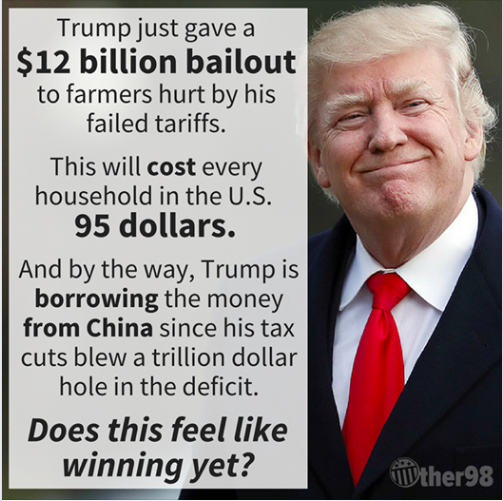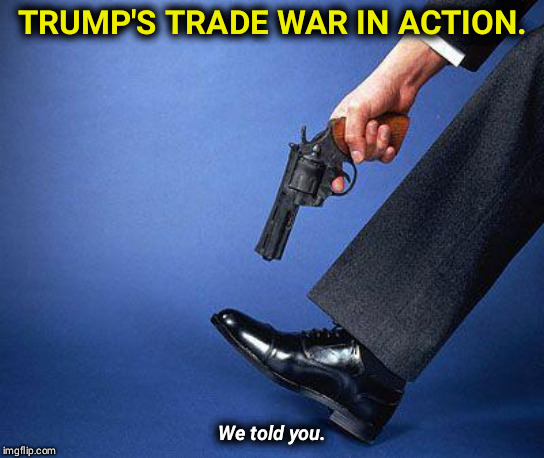Denizen
Gold Member
- Oct 23, 2018
- 4,837
- 1,070
- 190
- Banned
- #1
Everything Donald Trump has touched since January 2017 has turned brown and smelly.
Donald Trump levied tariffs on steel to create more jobs in the steel industry. However, the steel industry has lost jobs and is closing steelworks.
On top of that, steel prices went up to other US manufacturers who are now paying more for steel which has contributed to the downturn in US industries that use steel.
The negative effects of Donald Trump's tariffs prove that tariffs do not create jobs, they just raise prices and reduce demand.
"Trump repeatedly promised he would revive the steel industry through trade war measures primarily aimed at imports from China and Europe. The expectation of the tariffs and the tariffs themselves sent stock prices up in anticipation of huge profits. However, the protectionist measures have had the opposite effect."
Let us pray that Donald Trump's damage to the US and world economy is only temporary and will recover after Donald Trump's impeachment and expungement.
Steel layoffs in US mount due to falling production and trade war
Donald Trump levied tariffs on steel to create more jobs in the steel industry. However, the steel industry has lost jobs and is closing steelworks.
On top of that, steel prices went up to other US manufacturers who are now paying more for steel which has contributed to the downturn in US industries that use steel.
The negative effects of Donald Trump's tariffs prove that tariffs do not create jobs, they just raise prices and reduce demand.
"Trump repeatedly promised he would revive the steel industry through trade war measures primarily aimed at imports from China and Europe. The expectation of the tariffs and the tariffs themselves sent stock prices up in anticipation of huge profits. However, the protectionist measures have had the opposite effect."
Let us pray that Donald Trump's damage to the US and world economy is only temporary and will recover after Donald Trump's impeachment and expungement.
Steel layoffs in US mount due to falling production and trade war
Steel layoffs in US mount due to falling production and trade war
By Samuel Davidson
11 November 2019
Growing layoffs at major steel producers in the United States over the past three months point to a further slowdown in manufacturing and the impact of Trump’s trade war measures. All the major steel producers in the US have reduced production this year and this is now translating into a series of job cuts.
United States Steel (USS), the second largest steel producer in the US and once the symbol of US domination of industrial production, is facing a major crisis. The company’s stock has lost over 75 percent of its value since reaching a high of $45 per share in February 2018 when the Trump administration imposed a 25 percent tariff on steel imports. Today USS stock is trading at less than $11.
The company has announced that it will idle its tin mill in East Chicago, Indiana. The company claims that half of the 297 workers being laid off will be transferred to its other northwest Indiana steel mills, the Gary Works and the Midwest Plant in Portage. It gave no date for reopening the mill and most industry analysts expect it to permanently close because of falling demand for tin.
Earlier this year, USS shut down one of its blast furnaces at its Great Lakes Works near Detroit. Fifty workers were laid off at the time and another 200 lost their jobs at the end of September.
US Steel recently announced plans to buy a minority stake in Big River Steel for $700 million with the option to buy the rest of Arkansas-based steelmaker over the next four years. The buyout is part of USS’s cost-cutting measures. Big River uses an electric arc furnace to melt scrap metal instead of a blast furnace that produces new steel from iron ore.
Blast furnaces need to run at near peak capacity in order to be profitable while electric arc furnaces in so-called “mini-mills” can remain profitable at lower capacities. US Steel is also building new electric arc furnaces, but the decision to buy a competitor signals that the company needs to get into that market faster.
US Steel is not the only steelmaker slashing jobs. AK Steel has announced the closing of its mill in Ashland, Kentucky by the end of the year throwing all 260 employees out of work.
Earlier this year, TMK Ipsco Tubulars Inc. announced it was laying off 159 workers at its tubular plant in Wilder, Kentucky due to dropping demand from the oil and gas industry. Only 20 workers will remain, mainly for maintenance at the plant.
NLMK steel in Farrell, Pennsylvania laid off 100 workers over the summer citing the higher costs of steel imports. NLMK imported steel slabs from Russia and rolled them into finished products. The layoffs took place in the hot mill. About 300 workers are still working in other sections of the mill.
Last month, United Structures of America closed its plant in Portland, Tennessee, putting 45 employees out of work. The company blamed the layoffs on falling demand for steel from the construction industry.
Barber Steel Foundry in Rothbury, Michigan is closing this month, laying off all 61 employees. The foundry is part of Pittsburgh-based Wabtec Corporation, which manufactures locomotives and freight cars. Wabtec (Westinghouse Air Brakes Technology Corporation), which merged with GE Transportation, provoked a strike by 1,700 locomotive workers in Erie, Pennsylvania earlier this year that was isolated and betrayed by the United Electrical (UE) union.
Bayou Steel in Louisiana filed for bankruptcy October 1 and announced it was closing, putting 367 people out of work. Another 72 workers at its Harriman, Tennessee operations were also laid off. Bayou executives said they only had $50,000 in cash and were unable to secure credit.
Charlotte, North Carolina-based Nucor Corporation, the largest steelmaker in the United States, and Luxembourg-based ArcelorMittal, the largest steelmaker in the world, have both seen their stocks fall drastically this year and are under pressure to cut costs and jobs.
Nucor, which is also the largest mini mill operator, has seen its share value fall by nearly 25 percent since its high in 2018. ArcelorMittal’s stock has fallen nearly 60 percent, from a high of $36 in January 2018 to just $15.00. Like US Steel, ArcelorMittal relies primarily on blast furnaces to produce steel from iron ore.
During his election campaign, Trump repeatedly promised he would revive the steel industry through trade war measures primarily aimed at imports from China and Europe. The expectation of the tariffs and the tariffs themselves sent stock prices up in anticipation of huge profits. However, the protectionist measures have had the opposite effect.
US Steel, Nucor and ArcelorMittal all brought additional capacity online in anticipation of greater demand. While demand rose modestly, the additional capacity put online quickly led to a crisis of overproduction in the US market and falling steel prices. While there is a vast need for steel to repair and improve the infrastructure in the US and around the world, under the capitalist system of production for profit and the division of the world into rival nation-states workers now face the irrational prospect of being thrown into poverty because they have produced “too much” steel.
While most analyses point to tariffs as the cause of the crisis for steel producers, the general slowdown in production in the US and world economy is a major factor. US manufacturing has declined for the past three months while world demand is also down. ...

